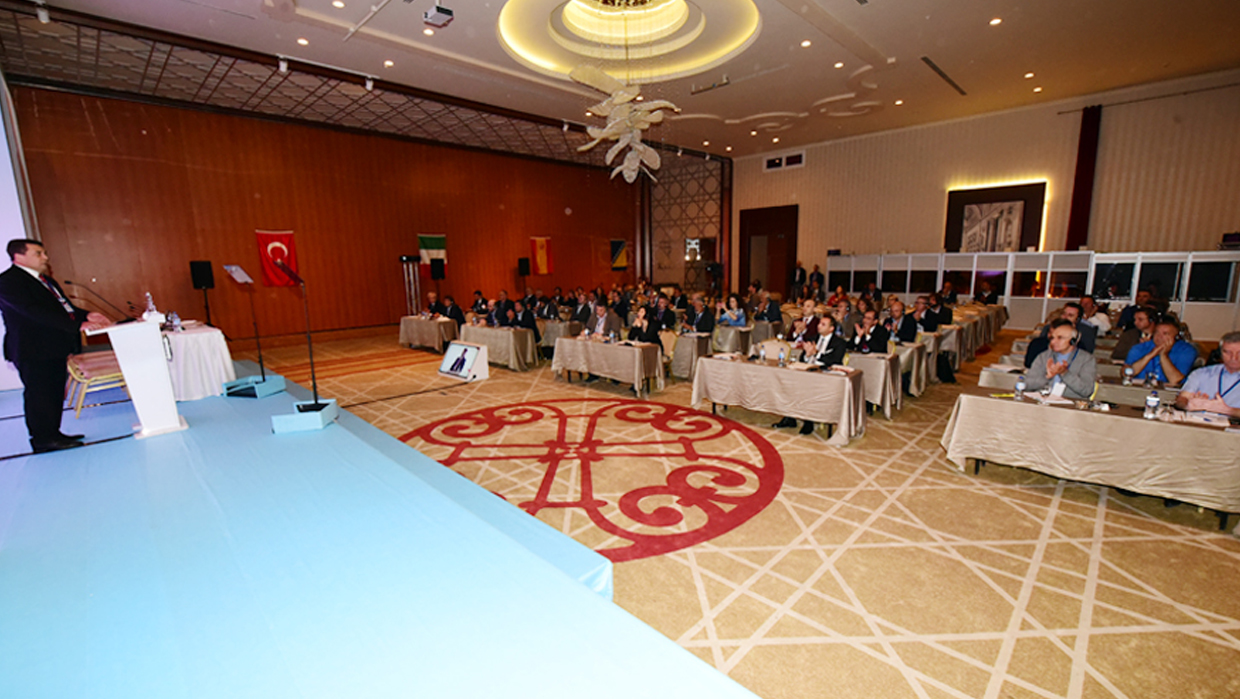The Mediterranean European Metalworkers' Conference, jointly organized by the Italian Development Association of Trade Unions Sindnova, the Italian Metalworkers' Union FIM-CISL, and the Turkish Metalworkers' Union, has begun in Istanbul. The opening program and the first working session of the conference, held at Istanbul Kaya Ramada Hotel, were completed in 03.04.2017. The conference, which started with an introduction by Turkish Metalworkers' Union Secretary General, Lawyer Taliphan Kıymaz, continued with a one-minute silence in memory of our worker brothers lost in workplace accidents, followed by the opening speeches.
The first opening speech was delivered by the late President of the Turkish Metalworkers' Union, Pevrul Kavlak. In his speech, he emphasized that globalization is crushing the working class and highlighted the importance of collective struggle.
Key points from the speech of the late President Pevrul Kavlak:
The real victims of globalization are the working class.
"Globalization is a regression, especially for those who live by their labor. Because globalization sweeps away the hard-won gains obtained through long struggles in individual countries, particularly in the European region. The working class, the employees, are the primary victims of this form of globalization. With globalization, demands for flexibility in employment have become widespread. Part-time work, which affects trade union organization, is increasing. Flexibility is being introduced in hiring and firing practices. The practice of subcontracting, which is one of the biggest obstacles to unionization, is becoming more common. All of these factors are weakening trade unions. This process, experienced alongside globalization, negatively affects the wages, working conditions, and power of unionized workers. The working class is losing significant rights. This is happening not only in certain countries but everywhere. Therefore, we all must accept the reality: the working class is being crushed by globalization."
Everyone who lives by their labor in the world is a brother.
"The diagnosis we have made of the problem is clear. The main task is to find a common solution and succeed in solving the problem together. In our opinion, all workers who live by their labor, who are exploited, and who are oppressed are brothers, regardless of their nationality. Therefore, we cannot divide workers as European, Asian, or African. Today, while we may operate under different structures, these are not alternatives to one another. On the contrary, they are complementary and supportive. No matter where in the world, regardless of religion, belief, or ethnic origin, all laborers who live by their work are brothers. Our primary duty is not only to protect the rights and interests of the workers we represent and to offer them a good life. Our primary duty is to contribute to the establishment of a just and humane order. We must strive to build a more peaceful and fair world where democracy prevails. It is everyone's duty to establish a system based on human rights and freedoms. As I have always said, what we can do as individual unions or even at the national level is limited. A solitary struggle will not lead to success. It will not be enough to fight alone against the elimination of our social rights and the end of injustice. There is a slogan often chanted during workers' protests in my country: 'There is no salvation alone; either all of us together or none of us...' This slogan sums up what I want to say. Because the working class's struggle against globalization can only be successful if it is effective on an international level. If we can unite with our class brothers and sisters in every region and country, we will be stronger in confronting employers. In other words, if we can organize a global level of working-class solidarity, if we can make this solidarity permanent, we will increase our chances of succeeding against this process. Let us not forget, no matter what country we are from, our fate is intertwined. Our path to victory lies in the international unity and organized struggle of the working class. We must forge a bond as strong as steel that no force can break." After the speech of the late President Pevrul Kavlak, opening speeches continued with FIM-CISL General Secretary Marco Bentivogli, IndustriALL Europe's Deputy General Secretary Luis Colunga, and ETUC Senior Advisor Patrick Itschert. Following the completion of the opening speeches, the opening program concluded.
After the opening program, the first working session of the Mediterranean European Metalworkers' Conference began. The session's theme was “The geopolitical context of the Mediterranean, demands for peace, the defense of democracy and freedoms, migration, the role of the European Union, and the stance of the BRICS (Brazil, Russia, India, China, and South Africa) countries.” The session was chaired by Turkish Metalworkers' Union Deputy General Secretary Yusuf Ziya Odabaş, and EURISPES Secretary General Marco Ricceri and METU International Relations Lecturer Assoc. Prof. Özgehan Şenyuva gave presentations on the topic.
The Mediterranean European Metalworkers' Conference, hosted by Turkish Metalworkers' Union, was attended by representatives from the Italian Metalworkers' Union FIM-CISL, the Italian Development Association of Trade Unions Sindnova, the Bosnian Metalworkers' Union, the Serbian Industrial Trade Union, the Autonomous Metalworkers' Union of Serbia, the Serbian IER Nezavisnost Union, the Montenegrin Metalworkers' Union, the Kosovar SPMK Union, the FGMM Metalworkers' Union affiliated with the French CFDT Confederation, and Spain’s UGT-FICA Union. Representatives from the European Trade Union Confederation (ETUC) and IndustriALL Europe also participated in the conference. Additionally, the event was attended by MESS Secretary General Lawyer Hakan Yıldırımoğlu, the current President of the Turkish Metalworkers' Union and former Financial Secretary Uysal Altundağ, academics, employer representatives, and numerous guests.
The Mediterranean European Metalworkers' Conference, which will be held between May 3-6, 2017, will conclude with three working sessions, a discussion program, and visits to TOFAŞ and Renault workplaces in Bursa.




